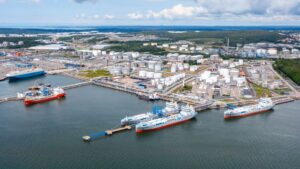
The goal is clear: shipping aims to become climate-neutral by 2050. An ambitious endeavour, considering that we are talking about an estimated 60,000 ships worldwide.
The use of alternative fuels and new propulsion concepts will be of major importance. Ian Beveridge, CEO of the Schulte Group, takes a look at the multi-fuel future.
Schulte Group´s CEO addresses the challenges that lie ahead for shipping, in a very interesting article, as the question of which alternative fuel will establish itself and prevail in the long run remains open.
“Investment decisions need to be reconsidered, ship concepts changed, and business models altered – all with the risk of backing the wrong horse.”
“The decision is associated with many risks for each owner,” Beveridge says, adding that “the availability and scalability of low-carbon and zero-carbon fuels will be a challenge.”
The use of alternative fuels and new propulsion systems will be of major importance.
Even before the adoption of the new IMO strategy, the number of new building orders with dual-fuel propulsion or at least with the retrofitting option has significantly increased, as the market prospects for ships with conventional fuel propulsion are likely to deteriorate in the future, as Ian Beveridge explains.
While alternative fuels such as LNG and biofuels are increasingly being used in shipping, the production and distribution infrastructure for these fuels is still underdeveloped. Additionally, the availability of these fuels and the requested bunkering, refuelling, and charging infrastructure may be limited in certain regions of the world.
Schulte Group´s CEO highlighted the fact that “Methanol is currently gaining prominence as an alternative fuel and is becoming increasingly important in new ship orders. For smaller, locally operated vessels, fully electric battery propulsion is also being considered.”
“Additionally, there are already orders for ships fuelled with ammonia and hydrogen. However, LNG is currently leading in ship orders, with more than 80% of newbuilding contracts placed last year for ships capable of non-conventional fuel propulsion being with this fuel.”
Beveridge considers that there is a need for political efforts to create the conditions that accelerate the production and distribution of alternative fuels and make them available to the maritime industry as quickly as possible. 2050 is not far away and the availability of zero-GHG marine fuels today is very limited.
The economic factor is, of course, also crucial. It is not going to be an easy journey. There are a number of issues that require solving before the industry can become truly carbon neutral.
“It all boils down to the availability and cost of green fuels to replace the hydrocarbon fuels we use today.
“We might not be able to switch to new fuels as quickly as we would like. Until then, we must make every effort to operate and optimise our fleets more efficiently, pushing them to their sustainability limits,” Beveridge added.


